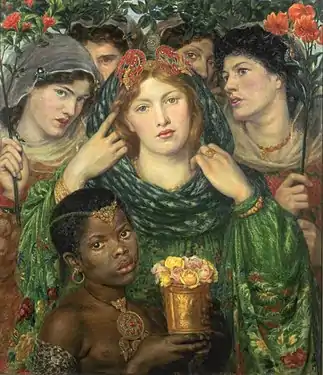The Beloved (Rossetti painting)
The Beloved (also The Bride) is an oil painting on canvas by English artist Dante Gabriel Rossetti, first painted in 1865 and now in Tate Britain.
| The Beloved | |
|---|---|
 | |
| Artist | Dante Gabriel Rossetti |
| Year | 1865–1866 |
| Medium | oil on canvas |
| Dimensions | 80 cm × 76 cm (31 in × 30 in) |
| Location | Tate Britain, London |
History
This painting illustrates the Song of Solomon. Two passages from the Song of Solomon are inscribed on the picture's gilded frame:
My beloved is mine and I am his (2:16)
and
Let him kiss me with the kisses of his mouth: for thy love is better than wine (1:2)
The bride, caught in the action of moving back her veil, is surrounded by her four attendants and a young Black child in the foreground of the painting. All contrast with the red hair and pale skin of the bride. From the darker skin of the child to the dark hair and eyes of the bride's attendants. It has been suggested that this colour contrast, carefully painted as a frame to the bride's features, was influenced by a controversial painting by Édouard Manet, entitled Olympia (first exhibited in 1865). Rossetti made a visit to Manet while working on The Beloved, and the painting also owes much to the works of Titian.[1] Others art historians have suggested that the paintings positioning of the models depicts the paler woman as more beautiful and therefore upholds whiteness as a standard of beauty.
Rossetti arranged the bride in a head-dress which is distinctly recognisable as Peruvian, and in a Japanese gown. Again, this abundance of exotic fabric frames the face of the bride, dominant in the centre of the canvas, with its western-European features. Rossetti ostensibly finished this oil in 1866, but continued to make changes to it throughout his life.[2]
Models
The models for the painting include:[3]
- Alexa Wilding (front, the bride)
- Ellen Smith (left)
- Marie Ford (back left)
- Fanny Eaton (1835-1924) (back right)
- Keomi Gray (1849-1914) (front right)
The both male and female children were used as models for the initial studies of the child attendant, Gabriel is the name of one of the children who modelled for this figure.[4]
See also
- English art
- List of paintings by Dante Gabriel Rossetti
- Rossetti and His Circle by Max Beerbohm
- Paintings by Dante Gabriel Rossetti
- Rossetti-Polidori family tree
- Fanny Eaton
References
- J. Treuherz, E. Prettejohn, and E. Becker. Dante Gabriel Rossetti. London: Thames & Hudson (2003).
- V. Surtees. Dante Gabriel Rossetti. Vol.I, Oxford: Clarendon Press (1971).
- Walker, Kirsty Stonell. "Dante Gabriel Rossetti's Models". ArtUK.org. Retrieved 18 November 2020.
- "The Beloved - Study for the Black Girl". Pre-Raphaelite Online Resource. Birmingham Museums & Art Gallery. Retrieved 18 November 2020.
Further reading
- Doughty, Oswald (1949) A Victorian Romantic: Dante Gabriel Rossetti London: Frederick Muller
- Fredeman, William E. (Ed.) (2002-8) The correspondence of Dante Gabriel Rossetti. 7 Vols. Brewer, Cambridge.
- Hilto, Timoth (1970). The Pre-Raphelites. London: Thames and Hudson, New York: Abrams.
- Linafelt, Tod (2002). "Biblical Love Poetry (...and God)". Journal of the American Academy of Religion 70 (2).
- Pope, Marvin H. (1977). Song of Songs: A New Translation with Introduction and Commentary.Anchor Bible 7C. 2 volumes. Garden City, New York: Doubleday.
- Ash, Russell (1995). Dante Gabriel Rossetti. London: Pavilion Books.
- Surtees, Virginia (1971). Dante Gabriel Rossetti. 2 vols. Oxford: Clarendon Press.
- Treuherz, Julian, Prettejohn, Elizabeth, and Becker, Edwin (2003). Dante Gabriel Rossetti. London: Thames & Hudson.
- Todd, Pamela (2001). Pre-Raphaelites at Home, New York: Watson-Giptill Publications.